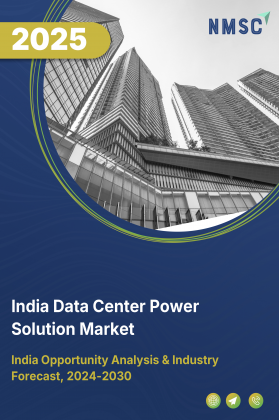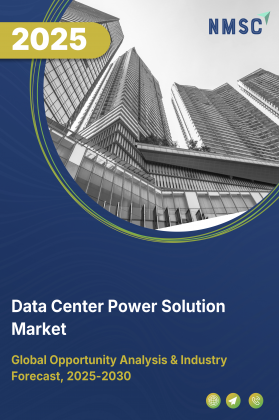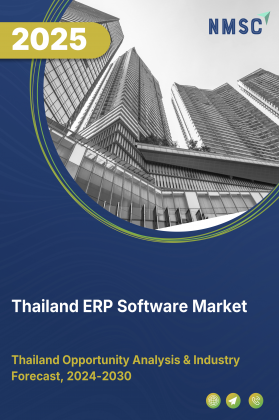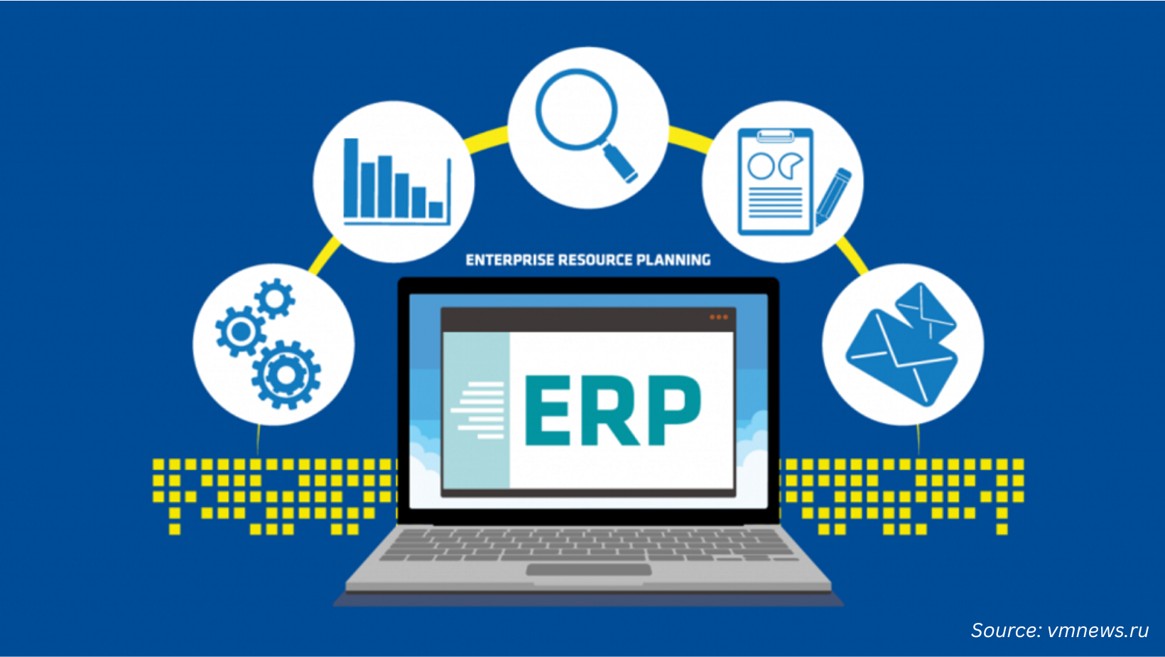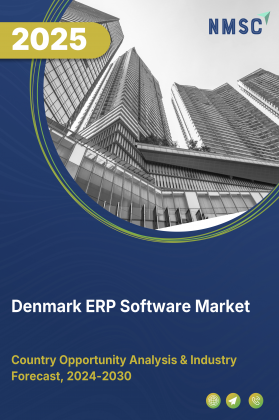
Denmark ERP Software Market by Component (Software, and Service), by Deployment (On Premise, Cloud, and Hybrid), by Business Function (Enterprise Asset Management, Financial Management System, Human Capital Management, and others), by Application (Manufacturing, BFSI, Healthcare, Retail & Distribution, and Others), by End User (Small and Medium Sized Enterprise, and Large Enterprise)- Opportunity Analysis and Industry Forecast, 2024–2030.
Industry: ICT & Media | Publish Date: 13-Nov-2025 | No of Pages: 155 | No. of Tables: 118 | No. of Figures: 63 | Format: PDF | Report Code : IC3594
Industry Outlook
The Denmark ERP Software Market size was valued at USD 1.76 billion in 2024 and is projected to grow to USD 2.10 billion by 2025. Additionally, the industry is expected to continue its growth trajectory, reaching USD 3.85 billion by 2030, with a CAGR of 12.8% from 2025 to 2030.
The Denmark ERP software market trends, ranking the fourth-largest sector in the region, is expanding steadily due to the nation’s strong digital infrastructure and government-led digitalization efforts, including a USD 1.3 billion investment in transformation initiatives. The retail and distribution sector are also accelerating ERP adoption as businesses embrace e-commerce and omnichannel strategies, requiring real-time data and streamlined logistics.
However, challenges such as stringent data protection laws and high digital saturation among enterprises are slowing new ERP deployments. Nonetheless, the integration of IoT technologies, exemplified by solutions like Epicor Kinetic 2025, is opening new growth avenues by enhancing real-time monitoring and operational efficiency across key industries.
Robust National Digitalization Fuels ERP Market Growth
Denmark ranks as holding the fourth-largest ERP software market share in the region and records the seventh-highest growth rate, driven by its robust commitment to digitalization. This digital-first approach has significantly influenced ERP software adoption across both public and private sectors. According to the United Nations E-Government Survey 2024, Denmark has retained its position as the top-ranked country in digital public services for the fourth consecutive time.
Furthermore, the Global Government Forum reports that the Danish government has invested approximately USD 1.3 billion in digital transformation initiatives. This progress is supported by Denmark’s advanced telecommunications infrastructure, strong digital literacy, and a highly skilled workforce, creating an optimal environment for ERP system integration.
As a result, Danish businesses are increasingly implementing ERP solutions to align with national digital standards, improve operational efficiency, and meet the rising demands of a digitally driven economy.
Growth in the Retail and Distribution Sector Drives Market Expansion
The expansion of the retail and distribution sector is also playing a pivotal role in boosting the Denmark ERP software market adoption. As companies strive to manage inventory, logistics, and customer data more effectively, integrated ERP solutions are becoming essential. According to the International Trade Administration, the retail and distribution landscape in Denmark is rapidly evolving, with increasing reliance on digital infrastructure.
The continued rise of e-commerce and omnichannel retailing further underscores the need for ERP systems that enable real-time data analytics and ensure seamless integration across multiple sales and service platforms. These developments highlight the vital role of ERP software in supporting digital transformation across Denmark’s growing retail and distribution industries.
Market Saturation Restraints ERP Market Adoption
Despite the positive outlook, the Denmark ERP software market growth faces notable challenges. The country's stringent data protection regulations, including compliance with GDPR, complicate the implementation of cloud-based ERP systems. Additionally, the high saturation of digital tools among enterprises limits the potential for new ERP deployments, slowing down the pace of industry development. To maintain momentum, ERP vendors must offer highly specialized, compliant, and scalable solutions tailored to the unique needs of the Danish market.
Iot Integration Delivers New Opportunities for ERP Systems Growth
The integration of Internet of Things (IoT) technology with ERP systems is rapidly emerging as a key driver of growth, offering real-time data visibility and improved operational control. IoT-enabled ERP platforms empower businesses to track inventory, monitor equipment performance, and predictive maintenance needs, significantly enhancing efficiency in sectors such as manufacturing and logistics.
In March 2025, Epicor Software Corporation launched Epicor Kinetic 2025, a next-generation ERP solution featuring advanced IoT integration for real-time monitoring and predictive maintenance in manufacturing settings. This development underscores the transformative impact of IoT on ERP functionality and highlights the increasing demand for smart, connected enterprise solutions.
Competitive Landscape
The market players operating in the Denmark ERP software industry include SAP SE, Microsoft Corporation, Oracle NetSuite, Rockwell Automation, Workday, Inc., Deltek, Inc., Infor, Unit4, Visma, Netcompany Group A/S, Monitor ERP, Columbus Global, Confirma Software, ECIT, Advania, and others.
Denmark ERP Software Market Key Segments
By Component
-
Software
-
Service
By Deployment
-
On Premise
-
Cloud
-
Hybrid
By Business Function
-
Enterprise Asset Management (EAM)
-
Record Assets (Asset Mgmt)
-
Analytics & BI
-
Disposal of Assets
-
Others
-
-
Financial Management System
-
Core Financials
-
Corporate Performance Mgmt (CPM)
-
Financial Consolidation
-
Others
-
-
Human Capital Management (HCM)
-
Talent Management
-
Administrative HR
-
Workforce Management
-
Others
-
-
Manufacturing and Operations
-
Production Planning and Scheduling Products
-
Production Ops and Control Products
-
Manufacturing Information Mgmt Products
-
Others
-
-
Supply Chain Management (SCM)
-
Inventory management
-
Warehouse management
-
Transportation management
-
Procurement
-
Contract Management
-
-
Others
By Application
-
Manufacturing
-
BFSI
-
Healthcare
-
Retail & Distribution
-
Government
-
IT & Telecom
-
Construction
-
Aerospace Defense
-
Other Industries
By End Users
-
Small and Medium-Sized Enterprise
-
Large Enterprise
Key Players
-
Microsoft Corporation
-
Oracle NetSuite
-
Rockwell Automation
-
Deltek, Inc.
-
Infor
-
Unit4
-
Visma
-
Net Company Grp. A/S
-
Monitor ERP
-
Columbus Global
-
Confirma Software
-
ECIT
-
Advania.
Report Scope and Segmentation
|
Parameters |
Details |
|
Market Size in 2025 |
USD 2.10 billion |
|
Revenue Forecast in 2030 |
USD 3.85 billion |
|
Growth Rate |
CAGR of 12.8% from 2025 to 2030 |
|
Analysis Period |
2024–2030 |
|
Base Year Considered |
2024 |
|
Forecast Period |
2025–2030 |
|
Market Size Estimation |
Billion (USD) |
|
Growth Factors |
|
|
Companies Profiled |
15 |
|
Market Share |
Available for 10 companies |
|
Customization Scope |
Free customization (equivalent up to 80 working hours of analysts) after purchase. Addition or alteration to country, regional, and segment scope. |
|
Pricing and Purchase Options |
Avail customized purchase options to meet your exact research needs. |

















 Speak to Our Analyst
Speak to Our Analyst



